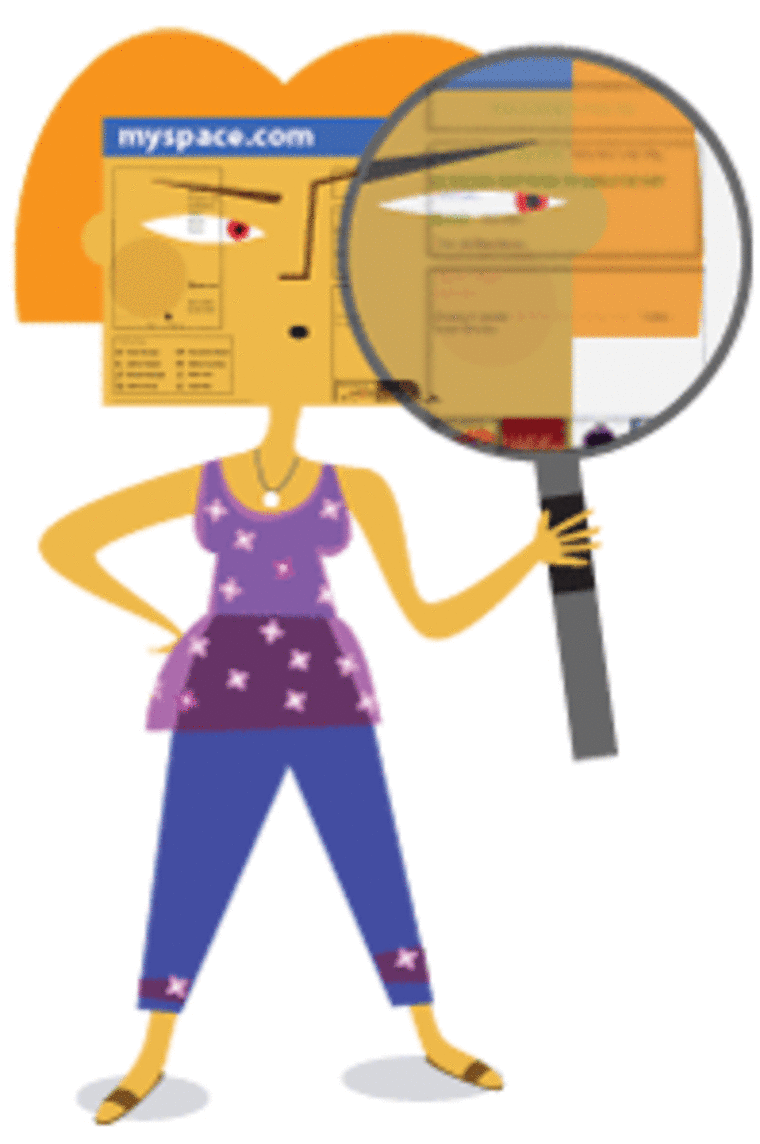When Jennifer signed up for Facebook, she never expected to stalk her college boyfriend, Chris.
Jennifer, a 23-year-old teacher, had just moved to Philadelphia for her first job. Chris, meanwhile, stayed behind in Los Angeles for his last year at Loyola Marymount University. They had agreed to cool things off so Chris could cut loose in his final year, but Jennifer says the two talked on the phone every day and still exchanged “I love yous.”
At first, Jennifer visited Chris’ Facebook page just to see his face. Then, other faces started to crop up … of girls. Though she says she’s not normally the jealous type, the photos — and distance — combined to make her paranoid. Soon, Jennifer was checking on her sort-of boyfriend every time she logged on.
“The potential to start stalking somebody on Facebook is very real,” she says.
(As you might imagine, some people interviewed for this story only wanted their first names used.)
You’ve heard about social-networking spying: Employers do it to job candidates, parents to kids — and couples to each other. Just how many couples use sites like MySpace and Facebook to keep each other in check is difficult to measure. But the fact that terms like “MyStalking” and “Facestalking” have entered the street lexicon speaks to their proliferation.
Couples might be tempted to spy on MySpace and Facebook because it’s legal, anonymous — and easy. But a few mouse clicks could turn a levelheaded person into a "lunatic," as one relationship expert puts it.
“The nature of the forum actually allows jealousy and suspiciousness,” says Jamie Turndorf, a psychologist and creator of drlove.com.
That doesn’t mean that everyone with a MySpace or Facebook profile will snoop on their boyfriends, girlfriends or spouses. Turndorf points out that social-networking sites will be more apt to spark jealously in people particularly prone to it.
“Then, the technology is like the kindling that will ignite your fire,” Turndorf says.
Those in shaky or young relationships are especially vulnerable to spying — and its effects. Tara and Jeff Mooney from Portland, Ore., MyStalked each other when they first met. Both were known to get rowdy at parties before they dated — and reminders of their wild pasts haunted their courtship.
"If anybody commented [on MySpace] from our pasts, we had a conversation," 24-year-old Tara says. "It brought up jealousy issues."
But Tara says the issues forced them to build trust early on — and today they’re not only still together, they’re happily married. What’s more, they’re both still on MySpace, but now, they just laugh off raunchy MySpace comments.
"[MySpace] could pose problems to people who aren’t secure in themselves or their relationships,” she says.
Jennifer had plenty of reasons to be insecure: Her first job was a strain and her comfort, Chris, was slipping away. As such, her spying got worse. What started on Facebook snowballed to an account on MySpace, which she set up just to watch Chris through his ex-girlfriend’s page. Jennifer used what she saw — or thought she saw — in arguments.
By winter break, Chris drew a definitive end to the blurry relationship — but Facebook broke the news to Jennifer. Most social-networking sites gather personal information from users, including their couple status. Theirs had stayed “In a Relationship” since college. But the day Chris decided to change his status, his now-ex-girlfriend got a formal e-mail from Facebook letting her know. Jennifer thinks her spying hastened the end.
"I was acting a little bit crazy," she says.
But for people with legitimate suspicions, social-networking sites can help catch a cheater.
MySpace did just that for Dustin from Issaquah, Wash. His gut told him something was up with his boyfriend, Austin, but he ignored it.
Dropping into his boyfriend’s profile occasionally revealed blatant comments from strangers, racy photos — and a relationship status that didn’t reflect the couple’s exclusivity. Dustin soon found out that Austin had been going out and meeting people behind his back.
In the end, Dustin didn’t need MySpace to nab his straying boyfriend, experts say. High-tech tools might make it easier to spy, but our guts are the best indicators of infidelity, says Turndorf.
“Your intuition is very rarely wrong,” she says. “You don’t need this technology to tell you if this person is dishonest or unfaithful. This is just confirming it.”
Jennifer is now single, back in Los Angeles — and friends with Chris. She would like to think she's learned from her spying experience.
"It's a bad tendency," she says. “But how can you not look at road kill?”
